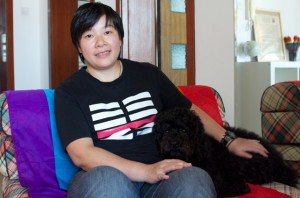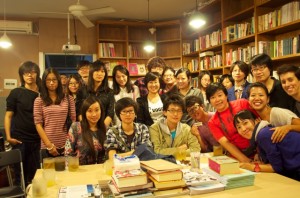Jennifer Chang and Lisa Dazols are a couple from San Francisco who embarked on a year-long world tour in June in search of gay people who are creating change for the LGBTQ community. Their project, Out and Around: Stories of a Not-So-Straight Journey, is a collection of their conversations with these “Supergays” around the world. Their trip will cover 15 countries across Asia, Africa, and South America, chosen because those are places where the LGBTQ movement is just starting to take shape, and they want to tell the stories of the people there who are leading the charge. Fridae will republish selected interviews on a regular basis. Readers can follow their journey on www.outandaround.com.

Xiangqi (Shiang-chi), founder of Shanghai Nvai
Given what a struggle it is to find an ‘out’ lesbian community in any part of the world, we really hit the jackpot in Shanghai when we met the ladies of Shanghai Nvai, Shanghai’s only lesbian group for local Chinese. Shanghai Nvai brings together sophisticated, engaging, and progressive women for salon discussions and social events.
The founder of Shanghai Nvai is Supergay Xiangqi (Shiang-chi), a soft-spoken woman with an unstoppable voice. Xiangqi wants her group to not only provide a community for lesbians, but to further share the lesbian culture with society at large. Xiangqi invited Lisa and I to come talk about our Out & Around journey at their meeting, and our discussion with this educated and inquisitive group was definitely one of the highlights of this year’s trip.
We also had a chance to sit down with Xiangqi for an interview at her new apartment, which she shares with her girlfriend and their dog. Due to Shanghai’s rapid growth, the city is demolishing old buildings to make room for new ones, and Shanghai Nvai’s orginal meeting space was one of the victims. With its large living area, Xiangqi plans to use their apartment as the group’s new space.
We talk to Xiangqi about her work with Shanghai Nvai and lesbian life in China…
Jenni: How did your group Shanghai Nvai come about?
Xiangqi: In 2001, I started a lesbian website. At the time in China, there were very few gay or lesbian websites. I ran this site for 6 years and met a lot of friends. Through the site, people were able to meet each other and talk about lesbian issues. The internet was such a critical platform for us during that time.
In 2005, I moved to Shanghai. That same year, a lesbian community group started up in Beijing. I felt Shanghai needed one as well, so I started Shanghai Nvai as a grassroots organization. In Shanghai, we are the only local lesbian community group, though there are quite a few community groups for gay men. Our ongoing activities include speakers and salon discussions with the public. And right now, we’re recording the oral history of lesbians in Shanghai. We record what their lives were like, what issues they faced, and how they overcame them.
Jenni: What motivates you to do this work?
Xiangqi: When I first started the website, I never thought that I would become a lesbian community organizer. I recall that some of my internet friends wanted to meet in person, but at that time I wasn’t willing to do so. Everything was still so secretive then. But I began to learn about the gay movement in Hong Kong and Taiwan, and I talked to some people from other countries, and my own attitude began to change. These new perspectives pushed me forward, and I began to think I could do some things for the community.

Jenni: Is your group involved with the Shanghai PRIDE event?
Xiangqi: In the beginning, Shanghai PRIDE was organized by Westerners. The first year, we did not attend even though we really wanted to. As individuals it would have been okay for us to attend, but we were mainly concerned that if the event were to run into problems [with the government], it could affect the Shanghai Nvai group. In the second year, we attended planning discussions and helped with some of the background work for PRIDE. But we were still careful and did not participate too much in the public events. This year, we are doing much more.
Jenni: What is your coming out story?
Xiangqi: As of now, I haven’t yet come out to my parents. But my mom, I believe she knows. I didn’t really come to terms with myself until 1999 or so. It was then that I first started using the internet – I loved to chat online, and I found a chat group for lesbians. At the time, there were very few people, maybe just one or two. But through them, I began learning about the lesbian culture.
At the time, I didn’t think too much about what it meant to become a lesbian myself. But eventually, I met a girl and we began a relationship, and these feelings really changed my thoughts about my own sexuality. I quit my job to move to her town and be with her. However, we broke up because she decided to marry, so that’s why I left and moved to Shanghai.

Jenni: Speaking of marriage, I’ve heard about faux marriages, where gay men and lesbian women marry one another.
Xiangqi: Yes, I see a lot of this, particularly in recent years. A lot of my friends have asked me to help them find gay men to marry. For our second volume of Shanghai lesbian oral history, we are actually recording stories about these faux marriages. Why do they do this? There are many reasons – some because they want to have children, but more so it is due to pressure from parents. Many lesbians may feel that its okay to be out of the closet with their friends or colleagues, but they don’t feel like they are able to come out to their parents. They don’t want to disappoint their parents, so they choose to enter these faux marriages.
Another reason, which may not be as obvious, is due to finances. Nowadays, it is expensive to live in Shanghai. Young people cannot afford to buy homes on their own. Often times, parents will offer to buy a house or a car on the condition that they marry. So gays and lesbians enter into faux marriages for this reason as well.
Jenni: What changes have you seen in Shanghai since you started your work in the lesbian movement?
Xiangqi: There have been a lot of changes. Before, I would never see other lesbians out in public on the streets. I remember when I went to Hong Kong back in 1999, I saw two girls kissing on the streets, and I was so surprised to see this. Now in Shanghai, I see girls all the time being very affectionate with one another in the public, and it is very clear that they are lesbians.
Jenni: If you could change one thing in China, what would it be?
Xiangqi: I would like to see education in schools about sexuality. Education has so much power to change people’s attitudes. If for example, legal or medical students were able to understand these issues when they are in school, then when they come out into society they can really make a difference to society.
